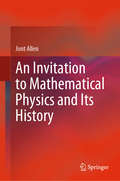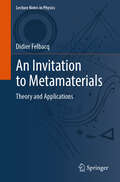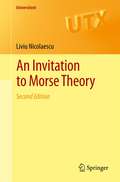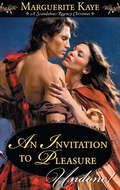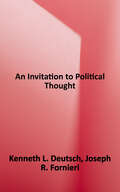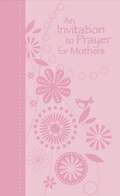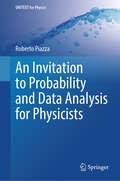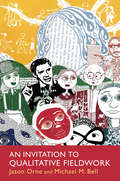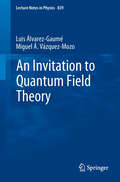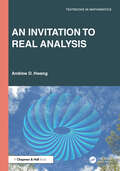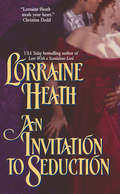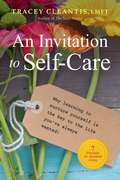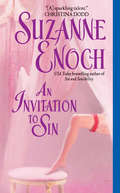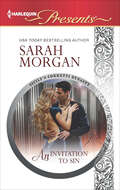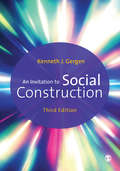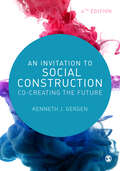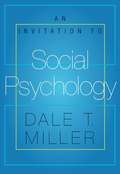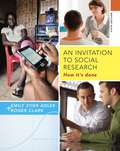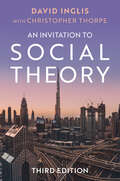- Table View
- List View
An Invitation to Mathematical Physics and Its History
by Jont AllenThis state of the art book takes an applications based approach to teaching mathematics to engineering and applied sciences students. The book lays emphasis on associating mathematical concepts with their physical counterparts, training students of engineering in mathematics to help them learn how things work. The book covers the concepts of number systems, algebra equations and calculus through discussions on mathematics and physics, discussing their intertwined history in a chronological order. The book includes examples, homework problems, and exercises. This book can be used to teach a first course in engineering mathematics or as a refresher on basic mathematical physics. Besides serving as core textbook, this book will also appeal to undergraduate students with cross-disciplinary interests as a supplementary text or reader.
An Invitation to Metamaterials: Theory and Applications (Lecture Notes in Physics #1037)
by Didier FelbacqThis book provides a thorough introduction to the fundamental principles and cutting-edge applications of metamaterials. It offers a balanced perspective, combining theoretical, experimental, and computational approaches. Topics covered include rapidly evolving areas such as metasurfaces, quantum metamaterials, and nonlinear metamaterials. The book also extends its scope beyond optics to explore applications in acoustics, thermal science, mechanics, and even seismology. A dedicated chapter discusses topological insulators, providing detailed insights into this advanced topic. The text is designed for advanced graduate students and early career researchers in the field of metamaterials. Specialists in the field will also benefit from the book's presentation of new developments and innovative approaches. Two chapters focus on advanced mathematical methods, including fiber bundles, Chern numbers, pseudodifferential operators, and scattering theory. These sections are crafted to be reasonably self-contained, with references provided for readers who wish to explore these topics further.
An Invitation to Model Theory
by Jonathan KirbyModel theory begins with an audacious idea: to consider statements about mathematical structures as mathematical objects of study in their own right. While inherently important as a tool of mathematical logic, it also enjoys connections to and applications in diverse branches of mathematics, including algebra, number theory and analysis. Despite this, traditional introductions to model theory assume a graduate-level background of the reader. In this innovative textbook, Jonathan Kirby brings model theory to an undergraduate audience. The highlights of basic model theory are illustrated through examples from specific structures familiar from undergraduate mathematics, paying particular attention to definable sets throughout. With numerous exercises of varying difficulty, this is an accessible introduction to model theory and its place in mathematics.
An Invitation to Morse Theory (Universitext)
by Liviu NicolaescuThis self-contained treatment of Morse theory focuses on applications and is intended for a graduate course on differential or algebraic topology, and will also be of interest to researchers. This is the first textbook to include topics such as Morse-Smale flows, Floer homology, min-max theory, moment maps and equivariant cohomology, and complex Morse theory. The reader is expected to have some familiarity with cohomology theory and differential and integral calculus on smooth manifolds. Some features of the second edition include added applications, such as Morse theory and the curvature of knots, the cohomology of the moduli space of planar polygons, and the Duistermaat-Heckman formula. The second edition also includes a new chapter on Morse-Smale flows and Whitney stratifications, many new exercises, and various corrections from the first edition.
An Invitation to Philosophy
by Nicholas Capaldi Eugene Kelly Luis E. NaviaSurvey of Western philosophy with a chapter on Oriental philosophy included.
An Invitation to Pleasure
by Marguerite KayeSusanna Hunter once ignored Captain Fergus Lamont's warnings not marry a fortune hunter -a decision she lived to regret. Three years later and since widowed, she's surprised by his unexpected invitation to spend Christmas with him in the Highlands. But even more shocking is Fergus's new proposition: that she pretend to be his fiancée, with all the accompanying pleasures....
An Invitation to Political Thought
by Joseph R. Fornieri Kenneth L. DeutschAn Invitation to Political Thought is a student-friendly introductory text/reader for political theory that includes a guided explanation of western political thought from Plato to Nietzsche with accompanying primary sources. An Invitation to Political Thought thus saves the student money by uniquely combining both explanatory essays and primary sources in a single volume. Each chapter begins with an examination of the life of and legacy of an epic political thinker and then proceeds to unpack that thinker's core teaching on such enduring questions as human nature, state and society, justice, political obligation, war and peace, political education, gender and politics, rights and revolution. Other pedagogical features include case studies that relate the material to current events, questions for reflection, a list of key terms, a list of sources, and helpful websites for further reading.
An Invitation to Prayer for Mothers
by Jack CountrymanBeautifully illustrated book with scriptures and prayers arranged topically to inspire, equip, and help mothers grow in their walk with the Lord and their calling of motherhood. This book has been priced affordably and makes a great gift for Mother's Day, birthday or as a presentation to new mothers on the birth of their child.
An Invitation to Probability and Data Analysis for Physicists (UNITEXT for Physics)
by Roberto PiazzaThis book is an introduction to probability, statistics, data analysis, and hypothesis testing in physics. It is designed to be taught at different levels, from basic to advanced, and to be enjoyed by anyone doing research in the physical sciences or related subjects. It aims to be a companion in a journey leading the reader to appreciate and enjoy the major role of these subjects in all aspects of the physical sciences. With specific examples, the book encourages readers to meditate on the distinctive meaning of probability in classical and quantum physics. The author draws on his teaching experience in statistical physics and data analysis, as well as his research work in fields like complex systems and soft matter, to provide a comprehensive introduction to statistical methods.
An Invitation to Qualitative Fieldwork: A Multilogical Approach
by Michael Bell Jason OrneIn an attempt to cope with the profusion of tools and techniques for qualitative methods, texts for students have tended to respond in the following two ways: "how to" or "why to." In contrast, this book takes on both tasks to give students a more complete picture of the field. An Invitation to Qualitative Fieldwork is a helpful guide, a compendium of tips, and a workbook for skills. Whether for a class, as a reference book, or something to return to before, during, and after data-collection, An Invitation to Qualitative Fieldwork is a new kind of qualitative handbook.
An Invitation to Quantum Field Theory (Lecture Notes in Physics #839)
by Luis Alvarez-Gaumé Miguel A. Vázquez-MozoThis book provides an introduction to Quantum Field Theory (QFT) at an elementary level--with only special relativity, electromagnetism and quantum mechanics as prerequisites. For this fresh approach to teaching QFT, based on numerous lectures and courses given by the authors, a representative sample of topics has been selected containing some of the more innovative, challenging or subtle concepts. They are presented with a minimum of technical details, the discussion of the main ideas being more important than the presentation of the typically very technical mathematical details necessary to obtain the final results. Special attention is given to the realization of symmetries in particle physics: global and local symmetries, explicit, spontaneously broken, and anomalous continuous symmetries, as well as discrete symmetries. Beyond providing an overview of the standard model of the strong, weak and electromagnetic interactions and the current understanding of the origin of mass, the text enumerates the general features of renormalization theory as well as providing a cursory description of effective field theories and the problem of naturalness in physics. Among the more advanced topics the reader will find are an outline of the first principles derivation of the CPT theorem and the spin-statistics connection. As indicated by the title, the main aim of this text is to motivate the reader to study QFT by providing a self-contained and approachable introduction to the most exciting and challenging aspects of this successful theoretical framework.
An Invitation to Real Analysis (Textbooks in Mathematics)
by Andrew D. HwangAdopting a student-centered approach, this book anticipates and addresses the common challenges that students face when learning abstract concepts like limits, continuity, and inequalities. The text introduces these concepts gradually, giving students a clear pathway to understanding the mathematical tools that underpin much of modern science and technology. In addition to its focus on accessibility, the book maintains a strong emphasis on mathematical rigor. It provides precise, careful definitions and explanations while avoiding common teaching pitfalls, ensuring that students gain a deep understanding of core concepts, and blending algebraic and geometric perspectives to help students see the full picture. The theoretical results presented in the book are consistently applied to practical problems. By providing a clear and supportive introduction to real analysis, the book equips students with the tools they need to confidently engage with both theoretical mathematics and its wide array of practical applications.Features Student-Friendly Approach making abstract concepts relatable and engaging Balanced Focus combining algebraic and geometric perspectives Comprehensive Coverage: Covers a full range of topics, from real numbers and sequences to metric spaces and approximation theorems, while carefully building upon foundational concepts in a logical progression Emphasis on Clarity: Provides precise explanations of key mathematical definitions and theorems, avoiding common pitfalls in traditional teaching Perfect for a One-Semester Course: Tailored for a first course in real analysis Problems, exercises and solutions
An Invitation to Seduction
by Lorraine HeathKitty Robertson has grown up wealthy and influential, and she's never more at home than when in an English parlour displaying her social graces. When she looks for a husband, of course she seeks a man just as home in his position--hopefully a lofty one--as she is. Nicholas Glenville, Marquess of Greystone, is just such a man. He is so attentive and gentlemanly that she can't help but accept his proposal of marriage, and is now looking forward to this Season being her last one as a single woman. But at the very first ball of the year she meets an enigmatic, gorgeous duke who asks her for a dance. That duke is Trevor Nicholson, a man who knows the marquess well enough to know that he would not make her any kind of husband at all. Instead he nominates himself for the position, but as he soon finds, convincing the beautiful Miss Robertson to marry him instead will be the trickiest--and most worthwhile--task of his life.
An Invitation to Seduction
by Lorraine HeathKitty Robertson has grown up wealthy and influential, and she's never more at home than when in an English parlour displaying her social graces.When she looks for a husband, of course she seeks a man just as home in his position--hopefully a lofty one--as she is. Nicholas Glenville, Marquess of Greystone, is just such a man. He is so attentive and gentlemanly that she can't help but accept his proposal of marriage, and is now looking forward to this Season being her last one as a single woman.But at the very first ball of the year she meets an enigmatic, gorgeous duke who asks her for a dance. That duke is Trevor Nicholson, a man who knows the marquess well enough to know that he would not make her any kind of husband at all. Instead he nominates himself for the position, but as he soon finds, convincing the beautiful Miss Robertson to marry him instead will be the trickiest--and most worthwhile--task of his life.
An Invitation to Self-Care: Why Learning to Nurture Yourself is the Key to the Life You've Always Wanted
by Tracey CleantisToo often, we settle for the notion that self-care means giving ourselves treats and rewards for good behavior. But it’s so much more than that. Welcome to the self-care revolution! A day of indulgence at a spa—or at home on the couch—might help us unwind and feel temporarily renewed, but is that all there is to self-care? In this book Tracey Cleantis changes the dialogue and shows why real self-care is more than just routine self-indulgence—it’s a lifelong practice that’s essential to finding fulfillment and joy. An Invitation to Self-Care uncovers seven principles for care that are rooted in self-empowerment and self-knowledge. Through personal stories and observations, exercises and quizzes, and interviews with experts and everyday people, Tracey invites you to consider self-care across your relationships, finances, spiritual and professional life—and more. By accepting who we are, what we need, and how those needs evolve over time, we create space for self-care’s transformational magic in our lives. In fact, an authentic self-care practice is the secret to the life you’ve always wanted.
An Invitation to Sin
by Suzanne EnochSeven marriageable daughters . . . And Lord Zachary Griffin is just the man to help them. After all, what could be more tantalizing than teaching the beautiful Witfeld sisters all the special ways of driving a man into submission--and marriage? And leading exquisite Caroline Witfeld, the most spirited and least frivolous sister, to temptation would be wildly delicious. Zachary doesn't realize that Caroline's longing gazes have less to do with attraction and more to do with admission--to a prestigious arts conservatory. If only she could set those high cheekbones, that aristocratic brow, and those powerful shoulders to canvas, her dreams would all come true. But Caroline is soon having dreams of a very different sort--ones that involve the charming rogue and some improper behavior hardly befitting a lady dedicated to her art . . .unless she becomes dedicated to the art of love.
An Invitation to Sin (Griffin Family #2)
by Suzanne EnochSeven marriageable daughters . . . And Lord Zachary Griffin is just the man to help them. After all, what could be more tantalizing than teaching the beautiful Witfeld sisters all the special ways of driving a man into submission--and marriage? And leading exquisite Caroline Witfeld, the most spirited and least frivolous sister, to temptation would be wildly delicious. Zachary doesn't realize that Caroline's longing gazes have less to do with attraction and more to do with admission--to a prestigious arts conservatory. If only she could set those high cheekbones, that aristocratic brow, and those powerful shoulders to canvas, her dreams would all come true. But Caroline is soon having dreams of a very different sort--ones that involve the charming rogue and some improper behavior hardly befitting a lady dedicated to her art . . .unless she becomes dedicated to the art of love.
An Invitation to Sin (Sicily's Corretti Dynasty #3146)
by Sarah Morgan“Morgan’s brilliant tale beautifully marries intense drama with laugh-out-loud humor. Her powerful dialogue, laced with sarcastic banter, is mesmerizing.” —RT Book Reviews (4 1/2 stars, Top Pick)Snapped and seduced: there’s nothing more dangerous than a restless Corretti . . . Taylor Carmichael holds one thing precious: the reputation she’s spent years rebuilding. Then one encounter with Corretti lothario Luca, a bottle of chilled champagne and a skintight dress and the paparazzi have their shot.Cool, calm and irritatingly aloof, Luca couldn’t care less. Splash his face over the papers—he has bigger fish to fry. But Taylor is fuming. Luca had the chance to halt the press and refused. Well, this time she’ll make the headlines work for her:Stop the press—bad boy Luca Corretti to wed screen siren Taylor Carmichael!“The setting is fabulous . . . What is best about the novel, however, is the dialogue. It sparkles . . . An Invitation to Sin is that rarity among romances: A book that surpasses one’s expectations in every way, and that I, for one, couldn’t put down again . . . Grade A.” —All About Romance“This is such an adorable book . . . I enjoy Sarah Morgan’s books, but this one might be my favorite . . . An Invitation to Sin made me laugh and smile so much.” —Smexy Books
An Invitation to Social Construction
by Kenneth J. GergenThis new edition of Kenneth J. Gergen’s celebrated text An Invitation to Social Construction is now even more accessible for students, offering a clear and thorough introduction to one of the most significant movements in contemporary social science. The Third Edition includes: updates reflecting the many new developments in theory, research, and practice a more student-friendly, personal writing style three new chapters on education, and therapy and health care, and organizations key insights into how social construction can help support you in your research projects, from start to finish. An Invitation to Social Construction is the must-read text for all social science students, academics and practitioners wishing to learn about social constructionism, along with the forms of inquiry and practice central to its impact.
An Invitation to Social Construction
by Kenneth J. Gergen`An Invitation to Social Construction is a rewarding read for newcomers to social constructionist thinking and for those well acquainted with this view. ' - New Therapist `Kenneth Gergen's book, An Invitation to Social Construction, may be the best introduction to the scholarship on social constructionism available today - but that's not all it is. It is also an inspiring and optimistic vision of what we can do to create better lives for ourselves. . . . Gergen's book is a key book for you to read' - Lois Shawver From a leading figure in the field, this introductory text forms an elegant overview of social constructionism that is at once wide-ranging and accessible. In this landmark work Kenneth Gergen charts the background to the social constructionist movement and outlines the major debates, topics and issues in a way that is at once profound yet highly readable. It is an interdisciplinary tour de force that will influence the development of teaching, research and social practice for years to come.
An Invitation to Social Construction: Co-Creating the Future
by Kenneth J. GergenThis fully updated fourth edition of Gergen’s An Invitation to Social Construction introduces you to a key theoretical movement in contemporary social science through a wide range of multidisciplinary examples. The fourth edition includes: wider consideration of contemporary global challenges, increased coverage of media, digital culture, and relevant political issues, updated real-world examples of social constructionist theory in action, in research, education, therapy, organizations, and peace building. This book brings together complex theories that inform and critically build upon social constructionism, such as narratology, deconstruction, dialogism, positivism, and post-structuralism, in a way that is accessible for students and researchers alike. It is a vital resource for those studying social psychology and critical social psychology who are looking for a comprehensive guide to one of the core topics in the field. Kenneth J Gergen is Senior Research Professor in Psychology at Swarthmore College, and the President of the Taos Institute.
An Invitation to Social Construction: Co-Creating the Future
by Kenneth J. GergenThis fully updated fourth edition of Gergen’s An Invitation to Social Construction introduces you to a key theoretical movement in contemporary social science through a wide range of multidisciplinary examples. The fourth edition includes: wider consideration of contemporary global challenges, increased coverage of media, digital culture, and relevant political issues, updated real-world examples of social constructionist theory in action, in research, education, therapy, organizations, and peace building. This book brings together complex theories that inform and critically build upon social constructionism, such as narratology, deconstruction, dialogism, positivism, and post-structuralism, in a way that is accessible for students and researchers alike. It is a vital resource for those studying social psychology and critical social psychology who are looking for a comprehensive guide to one of the core topics in the field. Kenneth J Gergen is Senior Research Professor in Psychology at Swarthmore College, and the President of the Taos Institute.
An Invitation to Social Psychology
by Dale T. MillerWhy does what others think of us matter so much? Why do people act in ways that seem to conflict with their stated beliefs? How does being part of a group impact our behavior and reactions to events and ideas? In this easy to understand book, the author uses experiences from everyday life to show readers how social psychology works. Ideas presented here are accessible both for people new to psychology as well as students and therapists.
An Invitation to Social Research: How It's Done (Mindtap Course List Series)
by Roger Clark Emily Stier AdlerWith real-world examples and an emphasis on ethics throughout, this book combines balanced coverage of quantitative and qualitative methods of social research with a unique “behind the scenes” approach. Built on focal research pieces and excerpts from real research projects, chapters present the insights, perspectives, and challenges of actual researchers in the field. The result is a comprehensive resource that guides readers step by step through the many stages of social research-from selecting a researchable question and designing a study to choosing the best method of data analysis for a particular study-and prepares them for the ethical issues and problems that they may face along the way. Reflecting the latest practices from the field, the book also integrates a greater emphasis on research focusing on evidence-based programs and policy.
An Invitation to Social Theory
by David InglisSocial theory is a crucial resource for the social sciences. It provides rich insights into how human beings think and act and how contemporary social life is constructed. But often the key ideas of social theorists are expressed in highly technical and difficult language that can hide more than it reveals. The new edition of this popular book continues to cut to the core of what social theory is about. Wide-ranging in scope and coverage, it is concise in presentation and free from jargon. Covering key themes and schools of thought from the classical thinkers up to the present, the third edition features a new chapter dedicated to post-colonial sociological theory. With updated literature and examples throughout, the book also includes refreshed pedagogical features to connect theory to readers’ own life experiences. Showing why social theory matters, and why it is of far-reaching social and political importance, the book is ideal for readers seeking a clear, crisp mapping of a complex but very rewarding area.
